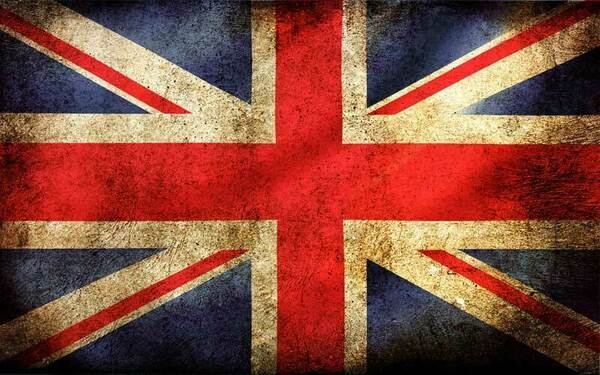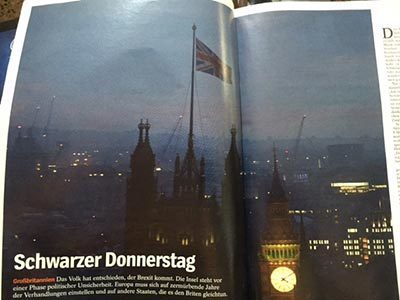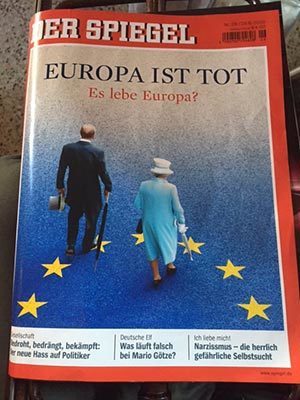
Responses below are arranged in reverse chronological order, newest responses on top. This page will be updated as new responses come in. Last update: 7/15/2016. -- Ed.
"The European Union has been unraveling since the turn of the millennium. Brexit is just another sign of this development, albeit a high profile one with repercussions beyond Europe. For an analysis of why the European project is in so much trouble and where it is headed, see this article at MIT Press Journals."
Sebastian Rosato, Department of Political Science
"What has happened in Britain, almost happened in Austria, and might happen in France and elsewhere is a sobering reminder of how the global economy has enriched some, impoverished others, and stagnated many more. It is easy to demonize those who support Trump, who voted 'Leave,' and who support right-wing nationalists politicians elsewhere. We who study the world, travel widely, and have friends and colleagues from all over are not like the vast majority of our fellow citizens—in whatever country they may reside. The great historian E. P. Thompson talked about 'enormous condescension.' We must avoid having no sympathy or empathy for those who are so much less fortunate than we are. Coal miners, factory workers, and farmers do not have tenure. And we members of the elite have ridiculed those less favored than we for decades. It is not surprising that they are objecting so mightily."
Thomas F. X. Noble, emeritus, Department of History
"This one year old op-ed by George Monbiot is even more compelling today."
François Ledrappier, emeritus, Department of Mathematics

"A sad day for Europe. On Friday morning, when the results of the British referendum on the EU became public, I just happened to be teaching a class of refugee children, many of whom have ended up in Berlin without their parents and immediate family. This is what I tried to express to them: To my generation, the EU was the hard-won "answer" to the hyperbolic nationalism of the Second World War. To see one of the EU's key members, and one of the word's most important economies, vote for particularism, nationalist self-assertion, and what the Germans call Alleingang -- a going of separate ways -- is deeply disheartening. One sees in several of the Saturday papers here in Germany the banner headline 'Bye-bye Britain!' But the mood is more somber than these headlines suggestion. I sense anger, frustration, and real concern about economic arrangements. By a razor-thin margin in a run-off election held about a month ago, Austria just barely avoided electing a nationalist, xenophobic president. Germans expected--or at least hoped for--a similar eleventh hour reprieve. They didn't get it."
William Collins Donahue, Department of Russian & German
"My $.02 would be that the pull of nostalgia for a Britannia for a former glory blinded a populace that has been increasingly stressed by all the brown and black people moving in, from former colonies and war-torn parts of the developing world. Whipped into a frenzy by unwise leaders demanding immediate action, and populist fear-mongers preying on their latent xenophobia, people panicked. I fear they will live to rue this rash action, when the UK starts to crumble from within. There are already calls for a Scottish referendum and Northern Ireland is looking south as well, to possibly join forces with the EU-member Republic of Ireland. The British market will likely be increasingly marginalized by global players, and fall into a long-term slump with major repercussions for the city of London. Jolly good way to start the summer, Brits. Hope they enjoy their self-imposed isolation. But there is always the royal family to lull everyone back into imperial melancholia and the dreams of former grandeur."
Julia Douthwaite, Department of French
"The Brexit is a disaster for Europe, but it may be worth keeping in mind that France and Germany have always been at the core of the Union. Their ability to cooperate over the last 70 years has been the basis for an unprecedented period of peace on the continent. It is imperative that the leaders of these states continue to work together in the Union, and work harder to convince their citizens of the importance of the Union. There is strong anti-EU sentiment on both the right and the left in France, a worrisome development. The Brexit is bad news, but it would pale in comparison with a divorce that would separate France from Germany."
Thomas Kselman, Department of History
"While I claim no expertise in any of the areas that are perhaps critical to understanding what the referendum results might mean, I did have this thought today: The paths to Heaven and Hell open up on both sides of many questions. That is to say, in my view both the Leave and the Remain campaigns had legitimate arguments in favor and legitimate reasons to fear. I myself would have voted to Remain, not because I think the EU in any way ideal, or even marginally successful in fulfilling its promise, but because I still believe in that promise. Many of the Leave side's criticisms are just, but I would be swayed by the notion that the UK after leaving will still have to deal with those problems but now without any voice in solving them. It is dismaying to see a great and noble idea like European unity unravel, even if some of those who have supported it in place have largely betrayed it themselves. The whole thing points out how we live in the tension not so much between good and evil, but between competing goods (with evil sneaking in wherever, regardless). So I am very sympathetic to the cosmopolitan idea of multi-national communities like the EU with its appeal to multiculturalism and universal values, but also dismayed at the extent to which some EU regulation has promoted homogenization of cultures and threatens local traditions and products. On the other hand, my admiration for 'local distinctiveness,' a sense of belonging to a community, and a spirit of place stops short of any exclusionary attitude that would tend toward scapegoating of those from 'outside.' I want to have it both ways. As to what happens next, no one has any idea. Having just recently read Christopher Clark's The Sleepwalkers, after hearing his presentation at the Nanovic, I can only say that I hope this vote does not put us back into the Summer of '14."
Steven Semes, School of Architecture
"In the short run, political and economic uncertainty might lead to a recession because investors will want to wait and see what the new rules will be. In the longer run, if trade is hindered, this may lead to permanent welfare losses for both the people in the UK and the EU. Of course, this could be managed by making sure that the uncertainty is resolved soon and free trade agreements are negotiated quickly. Politically, this is a silly decision and just the wrong answer for a globalized twenty-first century with globalized challenges. However, this is also an awful indictment of the aloof European elites that have lost all touch with a majority of the people in Europe and have made the European project a secular quasi-religion that brands everyone as right-wing populist that does not follow the mainstream creed to the letter and asks critical questions about the technocratic and undemocratic nature of EU institutions as well as bad European policies, often pushed through by an arrogant Berlin without any regard for its neighbors."
Ruediger Bachmann, Department of Economics
"An image of Thomas the Tank Engine, doing the rounds in these islands, is perhaps a suitable illustration."
James Smyth, Department of History
"In 1992, The Maastricht Treaty on European Union transformed the free movement of labor within the European Economic Community into a broader right for EU citizens. Citizens of every member state now had the right to work and reside in any other member state. In last week's referendum, a majority in the UK cast ballots to leave that system. Mainly they voted against receiving EU citizens from central and eastern Europe. In order to thrive, a system of economic integration that includes the free movement of persons needs either a shared sense of community or a state willing to enforce mutual respect. Yet few citizens ever identified as Europeans and the EU never had the power to compel the broad mass of people to accept others as having equal rights to live in their country. The UK and Europe will have to develop a new strategy for economic and political cooperation where people stay put."
Andrew C. Gould, Department of Political Science
"Like many people, I was unpleasantly surprised by the outcome of the vote. But the British government seems to have left itself a loophole for not following through with Brexit, especially if enough 'Leave' voters turn out to have second thoughts. My guess is that something like that is in the works."
Alexander Martin, Department of History
"Most musical streams, especially creative composition and so-called classical music, benefit from a wide international and cosmopolitan circuit. Brexit will impair orchestras and opera companies who often hire across Europe, and equally complicate the hiring of British artists by the rest of Europe. Young British composers and performers advancing sophisticated art music of no immediate commercial profit will suffer the stress and cost of visas and work permits while attempting to exhibit their work internationally. Paradoxically, emerging British performers may get easier attention internally in the UK, but it will remain a regional market for them, and it will be hard to show the best of Britain to the rest of the world. The artistic consequences are unpredictable. If the nativist sentiment suffocates the search for alternative funding and exchange channels, it may create a pall of musical provincialism that has been rare in Britain over the last century. I already see musicians promoting a dialogue to demonstrate that the arts in general and music in particular can renew the ties of human partnership across Europe. If the chance arises, the arts will encourage a repealing of this separatist decision."
Carmen-Helena Téllez, Department of Music
"Most likely outcome: none - except short-term panic and disruption. If the UK government has enough sense to delay invoking Article 50, the negotiations can drag on inconclusively until a solid majority in favor of the Union is re-established in England."
Felipe Fernandez-Armesto, Department of History
"A very short-sighted decision. The successful 'Leave' outcome was driven by older voters who yearned for the old, never to come again days of 'Rule Britannia!' A great majority of the younger Brits, fully understanding that Britain is much better off within, rather than outside the European construct were for 'Remain.' It is ironic that the generation that is beginning to wave good bye has made this decision for the generations of those whose lives will be impacted by it."
Alexander J. Hahn, Department of Mathematics
"Ideas about national sovereignty (deployed artfully and transnationally by a number of politicians) are perceived as salient and consequential by an important portion of the European electorate. The bottom line is that many citizens, especially those in underserved areas, feel that they should be in charge of their own existence. This is then a call for EU institutions to democratize their decision-making processes, and to act precisely on behalf of those who feel (often rightly so, it must be noted) that they are not represented by national authorities. Tenets such as subsidiarity should be safeguarded. At the same time, no country is self-sufficient, irrespective of certain politicians’ promises -- in the UK, in Italy, in the Netherlands, in France, and in Hungary, among other countries where the Right wing is investing in Euroscepticism. It is all too clear that national liberal democracies -- even ostensibly powerful ones -- are unable to cope in isolation with the global issues of our time, including those related to unemployment, the environment, human mobility, and security. National and EU authorities should understand this vote not as a resigned desire for 'no Europe,' but as an urgent call for a different Europe."
Maurizio Albahari, Department of Anthropology
"One of the most striking things about Britain’s decision to leave the EU is the way it has redrawn the political map of Britain. If you look at which areas have voted leave, they are predominantly labour strongholds — areas dominated by white working-class neighbourhoods. While we tend to think of nationalism (of which this result is unequivocally an expression) as a right wing, conservative, phenomenon, it the collusion of traditionally left-leaning, working class neighborhoods with conservative middle England which has driven the vote for Brexit. Perhaps the most lasting legacy of the result will be the consequences for what we consider to be 'right' and 'left,' and where we consider nationalism to be placed on that political spectrum."
Ian Newman, Department of English
“The ceremony of innocence is drowned;
The best lack all conviction, while the worst
Are full of passionate intensity.
— W. B. Yeats.”
Tobias Boes, Department of German & Russian
"Another case of 'Trumpism' on the other side of the pond: isolationism, trade reduction, anti-immigration, Make Britain great again, Britain first, throw out the rascals in power, a touch of racism. Its effect on both Britain’s and the global economy is yet to be seen, and that result may have a serious effect on the U.S. presidential election."
Jim Merz, Department of Physics
"What scares me is the possibility of a domino effect. There are several countries where opinions are also near 50:50, and the BREXIT may enliven the opponents of the Union. I know that in Poland there is an undercurrent of the exit sentiment, and with the right-wing government now in place, this may get worse. I also worry about a parallel trend in Hungary."
Jacek Furdyna, Department of Physics
"It is the blackest day in the history of the EU. Probably it will prompt further centrifugal tendencies in other countries. Even if not, the credibility of the EU as a lasting institution will suffer lasting damage."
Vittorio Hösle, Department of Philosophy
"I’m in London just now. In a word: dispiriting. You may have seen this headline? “EU parliament leader: ‘we want Britain out as soon as possible.’ President Martin Schulz says speeding up of UK exit being considered after ‘continent taken hostage because of Tory party fight’. Just so."
Christopher Shields, Department of Philosophy

"I believe that the British vote to leave the EU is a cause for deep concern. Beyond its economic implications, it is yet another manifestation of the unraveling of the post-World War II European project to devise alternatives to nationalist extremism and populist hysteria. Once Europe is taken apart, it is hard to see how it will be put back together in a desirable form."
A. James McAdams, Director, Nanovic Institute for European Studies